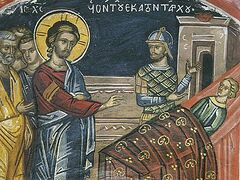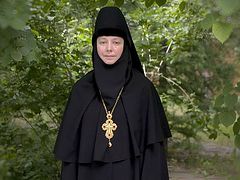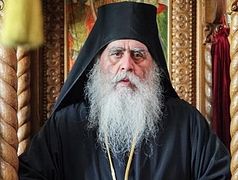On the feast of the holy Royal Martyrs, Pravoslavie.ru author Olga Orlova talked with mitred Archpriest Valerian Krechetov, rector of the Churches of the Protection of the Mother of God and of the New Martyrs and Confessors of the Russian Church in Akulovo near Moscow, about the podvig of being faithful to Christ and joint-heirs with Christ (Rom. 8:17).
God sends everybody the things that are the hardest for them to bear
—Now in Church circles the need to “crucify each other” is sometimes elevated to an ascetic principle. Are such things possible among Christians?
—God forbid! This principle is akin to making new and wrongful accusations against St. Nicholas II. They fail to understand that his heart must have been so faithful to God that he firmly walked towards his martyrdom and led the faithful with him, though he knew what would happen beforehand.
—But he ascended his Golgotha himself.
—Of course. Sometimes we read about Abraham: Take now thy son, thine only son Isaac, whom thou lovest, and get thee into the land of Moriah; and offer him there for a burnt offering upon one of the mountains which I will tell thee of (Gen. 22:2). As we read this, do we think about what was in Abraham’s soul at that moment? He was going to sacrifice his own son… True, he firmly believed that God would raise Isaac from the dead. But now Abraham had to kill his own child! His only, beloved and long-awaited child. It is truly hard for us to understand this.
—Archbishop Alexei (Frolov; 1947—2013) of Kostroma and Galich of blessed memory used to say that in every situation we should justify God and the people who have hurt us—even to the point of death, even death on the cross, as was the case with the Royal Martyrs and the host of the New Martyrs and Confessors. Should we condemn ourselves and justify everyone else—from cruel revolutionary monsters to God Himself?
—What does “justify” mean? We should first get at the root of this word. Blessed art Thou, O Lord: teach me Thy statutes1 (Ps. 119:12). The truth of God. How can we understand His truth in regard to ourselves? Whatever happens to someone concerns his individual personality. For some reason, different kinds of suffering are sent to those who suffer—some suffer in one way, others in another way. All of this is for a reason. The tree of the cross grows out of the earth of the heart. That is, the passions which are seething in our hearts. Regardless of the weight of our cross, it is we who have grown the tree it is made of. God sends everybody the things that are the hardest for them to bear…
—But this is something we call crucifixion!
—Yes, there is the following unwritten monastic rule: When a monastic aspirant comes to monastery, he is asked in detail about his likes and dislikes, and then he is given obediences he doesn’t like, and not the obediences he would enjoy.
It is same with suffering: God Himself decides on the type and degree of suffering for each one of us. The Apostle Paul was beheaded because he had persecuted Christians; the Apostle Peter was crucified because he had denied Christ before the Crucifixion. The Savior said to Peter, Follow thou Me (Jn. 21:22). I think there is a special meaning hidden here: Each apostle was martyred in a different way and destined to glorify Christ by death in a unique way. This is beyond our comprehension.
Commandments are commandments
—All that will live godly in Christ Jesus shall suffer persecution (2 Tim. 3:12)?
—It is a law. Do you remember any Great Holy Hierarch who wasn’t persecuted? Reread the Lives of Sts. Gregory the Theologian, Basil the Great and John Chrysostom—all of them were persecuted. At some moments even St. Philaret (Drozdov), St. John of Kronstadt and other saints were punished. They were summoned, interrogated and forbidden to do some things.
—And persecutors are among our brethren; we are persecuted from the inside.
—Yes. That is another regular occurrence. It is another matter when some disagree about something and their argument turns into opposition. For example, Metropolitan Sergius (Stragorodsky) once caused a serious controversy inside our Patriarchate, and many representatives of the ROCOR still mention his name with disapproval, sometimes using the term, “Sergianists.”
—Now certain forces are trying to set all Orthodox at loggerheads.
—But what about the forgiveness of St. Seraphim, who said, “If you prosecute those who have beaten me, I will leave Sarov”? No, these are just temptations. Is anyone greater than the Lord Who prayed on the Cross, Father, forgive them; for they know not what they do (Lk. 23:34)? This is how Christ prayed for those who were crucifying Him. But it is another matter that the degree of this forgiveness is simply beyond our strength.
Do you remember how some “Christians” came to St. Anthony the Great and asked him, “Give us a commandment!” He replied, “If someone strikes you on the right cheek, turn the left one.” They replied, “We can’t.” “Then bear it when someone slaps you on the right cheek.” “We can’t.” “Then don’t hit them back at least.” “We can’t.” Then St. Anthony called his novice monk and said to him, “Cook them some porridge and let them go.”
All these arguments about the highness of the commandments and the strictness of the Typicon are from the evil one. They are saying: “Let’s simplify the rules.” By no means! They must remain! Who can observe them and to what degree is another matter. But the Typicon should remain as it is, so that those who seek perfection can know what they should be guided by.
It was said: Love your enemies (Mt. 5:44); and further, And a man's foes shall be they of his own household (Mt. 10:36). Nowadays many families break up because people are no longer able to love each other even in the family.
Of course, things depends on us as well…
—Fr. Valerian, some say that if it were not for the seventeenth-century schism,2 there would have been no Russian Revolution.
—I don’t know. As a result of that schism, the Old Believers ended up without bishops. This was no coincidence—no bishops went into schism. And from the onset of the schism, the Old Believers have produced no saints.
In 2008, we celebrated the restoration of Eucharistic communion with the ROCOR. Then we celebrated the first Divine Liturgy together with Bishop Agapit (Gorachek) of Stuttgart at the Monastery of the Royal Martyrs at Ganina Yama (“Ganya’s Pit”). At that time an Old Believer priest, Fr. Sergei Komarov, was ordained. I led him around the altar. It was certainly a symbol of Church unity. All of us then gathered together at the chalice of Christ.
—Perhaps the experience of the New Martyrs can reconcile all of us?
—This must happen. Everybody should be united in the face of antichrist. Otherwise how will those who separate themselves from Orthodox unity be able to resist? The Bespopovtsy (“Priestless”) Old Believers don’t have the sacrament of ordination. The Popovtsy (“with priests”), who appeared later, claim that they received a bishop through Chrismation. How was it possible? That is absurd from a canonical perspective.
—It is known that people would go into schism and even burn themselves because they believed that the end of the world had come. And now it appears that we will all be united at the end times?
—One day I asked Fr. Sergei Orlov [Archpriest Sergei Orlov (1890–1975), rector of the Church of the Protection of the Mother of God in Akulovo near Moscow and a famous spiritual father.—Trans.]: “Is the end of the world near?” And he answered: “100 years are probably left.” He said this over forty years ago—that is, about half of that time has elapsed.
—Does anything depend on us? Maybe we should do something more actively or, on the contrary, humble ourselves?
—We should humble ourselves more actively because we do it very inactively. The life of each individual influences what goes on in a particular country or across the globe. This is something we’ve just spoken about—an interior life that is known to God alone determines what is going on permanently. In the Old Testament, the prophet says, “This is how you pray, people? This is what you do!” He saw the whole of Israel, with each Israelite standing in front of his altar and censing his own idol—in accordance with the things they served. We can see the same in our days. St. Seraphim of Sarov had a vision: Prayers like incense were rising up to heaven all over Holy Russia. Something does depend on us. God rules the world, seeing human hearts.




